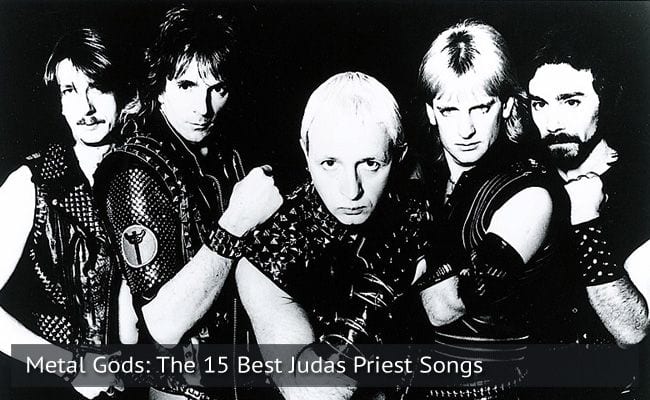I present to you the 15 best songs by Judas Priest, expanded from the original idea of ten simply because the band’s legacy is too important, the discography too large, and — which may be surprising to neophytes — too eclectic to limit to just ten. All fanboy bias was thrown out the window in favor of objectivity — otherwise “Delivering the Goods” and “Starbreaker” would have been right up there — so I dug up what I consider the band’s most important tracks, whether relating to influence, popularity, longevity, or in several cases, all of the above.
15. “Exciter” (Stained Class, 1978)
Following the lead of Deep Purple’s 1971 song “Fireball”, which at the time featured some of the fastest kick beats heavy metal had heard, “Exciter” cranks up the intensity a hundredfold. Propelled by a throttling double-time beat by drummer Les Binks, double kicks in overdrive brought unprecedented speed, intensity, and dexterity to the genre. The rhythm riffing by Glenn Tipton and KK Downing is sharp and robust, their twin leads searing, while Rob Halford turns in an astounding vocal performance. The song would profoundly influence the thrash/speed metal wave of the early 1980s, inspiring the Canadian speedsters of Exciter to name their band after it.
14. “Metal Gods” – (British Steel, 1980)
A bit of an oddity on an album specifically designed for mainstream success, the churning, martial “Metal Gods” was also one of Priest’s heaviest songs to date. Atop a simple yet wonderfully rigid rhythm section by Ian Hill and Dave Holland, shuffling hi-hat giving it just the slightest sense of groove, the chorus features an effective call-and-response between a detached-sounding Halford and a similarly mechanical-sounding Tipton and Downing. It also features the band at its most creative in the studio, whipping guitar chords, smashing pool cues, and most famously, dropping trays of cutlery to achieve the song’s vivid sound effects.
13. “Living After Midnight” (British Steel, 1980)
The most overtly commercial song on the breakthrough British Steel, “Living After Midnight” still sticks in the craws of some fuddy-duddy metal old-timers, but as trite as this little party anthem is, its hook is irresistible and glorious, the sound of a band learning that it never hurts to have a little fun once in a while. Backed superbly by Holland’s sharp, powerful backbeat — his simple style was the reason he was hired to play on this album — the song is all about the hook rather than the riff, emphasized by the fact the song starts with the chorus. In the tradition of Montrose, AC/DC, and Van Halen, and predating the glam metal explosion of the 1980s, the song is oddly clean-cut, hedonism rendered a little innocent, and kind of sweet. It would become an instant hit, making Judas Priest a household name, and would go on to be one of the band’s most beloved live staples.
12. “Freewheel Burnin'” (Defenders of the Faith, 1984)
Technically, it’s not doing anything different than what “Exciter” did six years earlier, but what “Freewheel Burnin'” has over that seminal track is mystique. Tom Allom’s production is incredibly dense, lending an already heavy song an added layer of darkness. The guitar tone is tar thick, yet sleek, Holland’s robotic drumming — a far cry from the unhinged speed of Metallica and Slayer that same year — cold and impersonal, while Halford’s vocals are over the top, screaming, screeching, spitting out lines like bullets. Capped off by the greatest twin solo by Tipton and Downing, it was a defiant, anti-commercial single in 1984, its intensity anticipating “Painkiller” six years later.
11. “The Ripper” (Sad Wings of Destiny, 1976)
The most overtly theatrical track on the groundbreaking Sad Wings of Destiny, it’s no secret Rob Halford wanted to emulate Queen’s A Night at the Opera, which was made at Rockfield Studios in Wales right before Judas Priest went there to record its second album. And indeed, starting with that blood-curdling, fader-fiddling intro the musical depiction of Jack the Ripper is an inspired example of heavy metal at its most theatrical, two minutes and 51 timeless seconds of flamboyance and menace, led by Halford’s shattering vocal performance.

